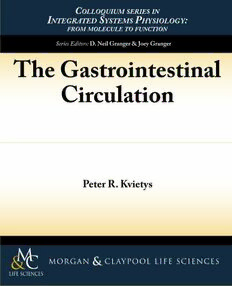
The Gastrointestinal Circulation PDF
140 Pages·2010·3.991 MB·English
Most books are stored in the elastic cloud where traffic is expensive. For this reason, we have a limit on daily download.
Preview The Gastrointestinal Circulation
Description:
The microcirculation of the gastrointestinal tract is under the control of both myogenic and metabolic regulatory systems. The myogenic mechanism contributes to basal vascular tone and the regulation of transmural pressure, while the metabolic mechanism is responsible for maintaining an appropriate balance between O2 demand and O2 delivery. In the postprandial state, hydrolytic products of food digestion elicit a hyperemia, which serves to meet the increased O2 demand of nutrient assimilation. Metabolically linked factors (e.g., tissue pO2, adenosine) are primarily responsible for this functional hyperemia. The fenestrated capillaries of the gastrointestinal mucosa are relatively permeable to small hydrolytic products of food digestion (e.g., glucose), yet restrict the transcapillary movement of larger molecules (e.g., albumin). This allows for the absorption of hydrolytic products of food digestion without compromising the oncotic pressure gradient governing transcapillary fluid movement and edema formation. The gastrointestinal microcirculation is also an important component of the mucosal defense system whose function is to prevent (and rapidly repair) inadvertent epithelial injury by potentially noxious constituents of chyme. Two pathological conditions in which the gastrointestinal circulation plays an important role are ischemia/reperfusion and chronic portal hypertension. Ischemia/reperfusion results in mucosal edema and disruption of the epithelium due, in part, to an inflammatory response (e.g., increase in capillary permeability to macromolecules and neutrophil infiltration). Chronic portal hypertension results in an increase in gastrointestinal blood flow due to an imbalance in vasodilator and vasoconstrictor influences on the microcirculation.
See more
The list of books you might like
Most books are stored in the elastic cloud where traffic is expensive. For this reason, we have a limit on daily download.
